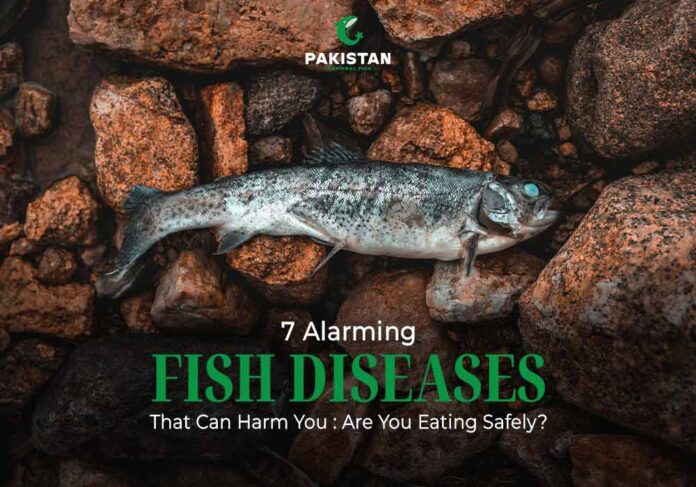Table of Contents
What Happens If You Eat Sick Fish?
Eating a sick or spoiled fish can wreak havoc on your health. The consequences range from mild discomfort to severe, life-threatening conditions. Here’s what could happen:
- Food Poisoning: Consuming contaminated fish often leads to food poisoning from fish, with symptoms like nausea, vomiting, diarrhea, and abdominal pain appearing within hours.
- Neurotoxin Exposure: Certain fish carry toxins like ciguatera, which can cause neurological symptoms such as tingling, dizziness, or even paralysis.
- Bacterial Infections: Pathogens like Vibrio or Salmonella can survive in sick fish, leading to infections that may require medical attention.
- Allergic Reactions: Some fish diseases amplify allergens, triggering reactions in sensitive individuals.
The severity depends on the type of contamination, the fish’s condition, and your immune system. Immediate medical attention is critical if symptoms escalate.
What Diseases Can Sick Fish Cause to Humans?
Disease | Cause | Symptoms |
Ciguatera Poisoning | Ciguatera is caused by toxic algae consumed by fish | Nausea, tingling, muscle pain, reversal of hot/cold sensation |
Scombroid Poisoning | Histamine buildup in spoiled fish | Rash, sweating, headache, diarrhea |
Vibriosis | Vibrio bacteria in contaminated fish | Fever, chills, skin lesions, stomach upset |
Salmonellosis | Salmonella bacteria in improperly handled fish | Fever, diarrhea, abdominal cramps |
Botulism | Clostridium botulinum in improperly preserved fish | Blurred vision, muscle weakness, paralysis |
How to Identify a Sick Fish Before Cooking?
Spotting a sick fish before it hits your plate is your first line of defense. Here’s how to check:
- Appearance: Healthy fish have bright, clear eyes and shiny scales. Sick fish may have cloudy eyes, dull scales, or visible lesions.
- Texture: Fresh fish feels firm to the touch. If the flesh is mushy or leaves an indent when pressed, it’s likely sick or spoiled.
- Gills: Check the gills—they should be bright red or pink. Brown or gray gills indicate deterioration.
- Odor: A healthy fish smells like the ocean. A sour, ammonia-like smell is a red flag.
Pro Tip: When buying whole fish, ask the vendor to let you inspect it closely. Trust your senses—they’re your best tool!
What Are the Signs of Smelly (Spoiled) Fish?
Spoiled fish is a breeding ground for bacteria and toxins, and its smell is a giveaway. Here are the signs to watch for:
- Foul Odor: A strong, rancid, or ammonia-like smell indicates spoilage.
- Slimy Texture: Spoiled fish develops a sticky, slimy coating on its surface.
- Discoloration: Look for yellowing or browning flesh, especially around the edges.
- Gas Bubbles: In packaged fish, bloating or gas bubbles suggest bacterial growth.
Safety Hack: If the fish smells bad even after rinsing, discard it immediately. No amount of seasoning can mask spoilage.
How Can You Avoid Food Poisoning from Fish?
Preventing food poisoning from fish requires vigilance at every step, from purchase to preparation. Follow these steps:
- Buy from Trusted Sources: Choose fish from vendors with high hygiene standards and proper refrigeration.
- Store Properly: Keep fish at 32–38°F (0–3°C) and use it within 1–2 days. Freeze if not cooking immediately.
- Cook Thoroughly: Cook fish to an internal temperature of 145°F (63°C) to kill most bacteria. Use a food thermometer for accuracy.
- Avoid Cross-Contamination: Use separate cutting boards and utensils for raw fish to prevent bacterial spread.
- Check for Freshness: Always inspect fish for signs of spoilage before cooking.
Research Insight: The FDA recommends chilling fish on ice immediately after purchase to slow bacterial growth, especially in winter when temperature fluctuations can accelerate spoilage.
Is Raw Fish Riskier Than Cooked Fish?
Raw fish food poisoning is a real concern, especially with dishes like sushi or ceviche. Here’s a breakdown of the risks:
- Raw Fish Risks:
- Higher chance of parasitic infections like Anisakiasis, caused by worms in raw fish.
- Greater susceptibility to bacterial contamination (e.g., Vibrio) since cooking kills most pathogens.
- Toxins like ciguatera remain unaffected by freezing or marinating.
- Cooked Fish Benefits:
- Cooking eliminates most bacteria and parasites, reducing the risk of food poisoning.
- Proper cooking can denature some (but not all) toxins, making fish safer.
Important Note: If eating raw fish, choose sushi-grade fish from reputable suppliers and ensure it’s been flash-frozen to kill parasites.
What Are Neurotoxins in Fish and Why Are They Dangerous?
Neurotoxins are toxic compounds that affect the nervous system, and some fish can carry them. For example, ciguatera is caused by toxic algae consumed by reef fish like barracuda or snapper. Here’s why they’re dangerous:
- Symptoms: Neurotoxins can cause tingling, numbness, dizziness, and even paralysis. Ciguatera may also lead to a bizarre hot-cold sensation reversal.
- Persistence: Unlike bacteria, neurotoxins aren’t destroyed by cooking or freezing.
- Long-Term Effects: Some neurotoxin-related symptoms can persist for weeks or months.
Prevention Tip: Avoid eating large reef fish from tropical waters, as they’re more likely to carry ciguatera toxins.
Should You Fast When Sick from Fish Poisoning?
Fasting when sick from fish poisoning can help in some cases, but it’s not a one-size-fits-all solution. Here’s what to consider:
- Benefits of Fasting:
- Gives your digestive system a break, reducing strain during nausea or vomiting.
- May help flush toxins faster by limiting food intake.
- When to Avoid Fasting:
- If you’re dehydrated from vomiting or diarrhea, fasting can worsen symptoms.
- Severe cases require medical intervention, not just fasting.
Expert Advice: Stay hydrated with water or electrolyte drinks and consult a doctor if symptoms persist beyond 24 hours. Fasting should only be a short-term measure.
FAQs
Conclusion
Navigating the risks of fish diseases and ensuring safe consumption is vital for your health, especially during winter when fish are more prone to spoilage. By understanding the dangers of spoiled fish, recognizing the signs of a sick fish, and taking precautions like proper storage and thorough cooking, you can significantly reduce the risk of food poisoning from fish or exposure to harmful neurotoxins. Whether you enjoy raw sushi or prefer cooked dishes, prioritizing freshness and hygiene is key.
Stay vigilant, trust your senses, and source fish from reputable suppliers to keep your meals safe and delicious. If you suspect fish-related illness, act quickly—hydrate, seek medical advice, and consider fasting when sick only under guidance.
Protect your plate and savor seafood with confidence!


